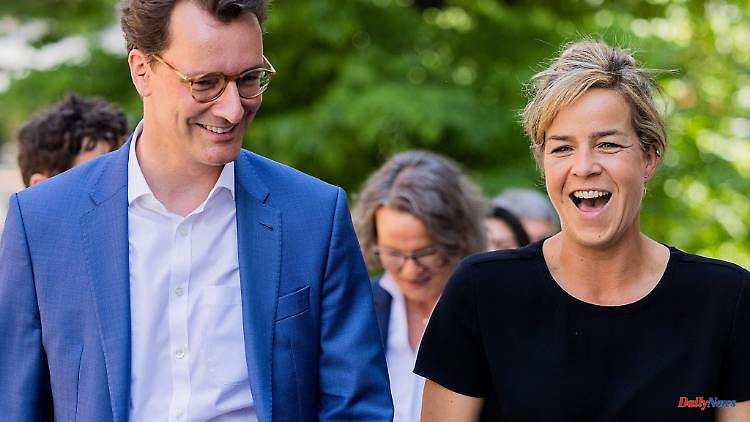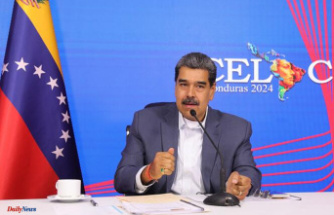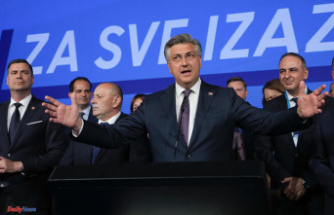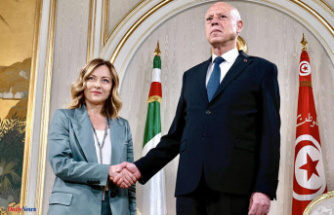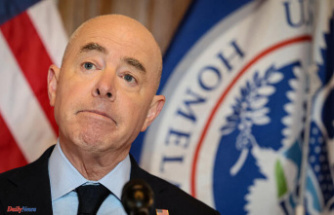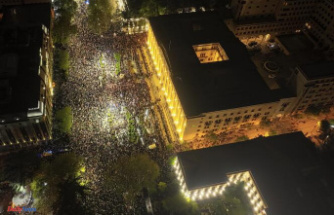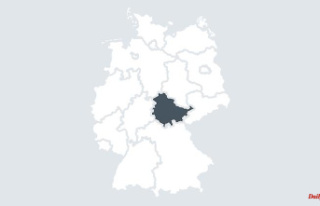In North Rhine-Westphalia, the first black-green coalition for the most populous federal state is in the offing. The CDU and the Greens want to hold exploratory talks this week. The first decisions are to follow two weeks after the state elections.
Dusseldorf (dpa / lnw) - CDU and Greens in North Rhine-Westphalia are speeding up the formation of a possible coalition. Nine days after the state elections, delegations from both parties will meet in Düsseldorf on Tuesday for their first exploratory round. The eleven-strong delegations are led by the CDU election winner and Prime Minister Hendrik Wüst and Green Party leader Mona Neubaur.
The committees of the CDU and the Greens want to decide on the start of coalition negotiations as early as next Sunday. The Greens come together for a small party conference, according to a spokesman for the CDU, the extended state executive decides. It would be the first alliance of both parties in the most populous federal state.
"A small party conference on May 29 will decide whether we can find a substantive basis for entering into coalition negotiations," wrote Neubaur on Twitter. "We are aware that the talks that are now to follow will not be easy and that some of those involved will have to go a long way."
The CDU with top candidate Wüst clearly won the election on May 15 with 35.7 percent. With 26.7 percent, the SPD slipped to its worst result in a state election in North Rhine-Westphalia. The Greens were able to almost triple their share of the vote compared to 2017 to 18.2 percent and ended up in third place. The FDP lost heavily and only got 5.9 percent. The AfD reached 5.4 percent.
The CDU and Greens would therefore have a comfortable majority in the new state parliament. A traffic light coalition with SPD, Greens and FDP and a grand coalition of SPD and CDU would also be mathematically possible. However, both variants are considered unlikely.
The Green Youth was again critical of the forthcoming coalition. "It is also clear to us as a left-wing youth association that we would have a hard time with black and green," it said in a statement. The Greens youth organization mentioned, among other things, differences in internal security.
Regardless of the black-green soundings, the CDU and the SPD, who lost the election, also want to remain in contact in the future. That's what Wüst said on Monday after a 70-minute talk with SPD state leader Thomas Kutschaty in the Düsseldorf state parliament.
"It's important that you simply have and maintain a collegial, fair and professional exchange with each other outside of election campaigns," said Wüst. "In normal business and when you look at the crises of the last few months and years, it's always important to be able to talk to each other." That's how the relationship between the CDU and SPD has always been - "and that's how it should stay".
Kutschaty said: "We have addressed various major challenges that need to be accomplished in the next few years and we are in good contact." The SPD election loser also restricted: "Of course we already know where our differences are." Among other things, the conversation was about climate protection, education and internal security.
While the soundings for the formation of a new NRW state government are progressing, the parliamentary groups are preparing for the constituent session of the new state parliament on June 1st. The CDU parliamentary group wants to nominate the new state parliament president on Tuesday. It is considered likely that incumbent André Kuper will be re-elected head of the state parliament. The 61-year-old has held the highest office in the country since 2017.
Traditionally, the strongest parliamentary group has the right to propose. According to the current Rules of Procedure of the State Parliament, the President of the State Parliament has three deputies. In the past legislative period, these offices were held by MPs from the SPD, Greens and FDP. The AfD parliamentary group's proposal failed in 2017. It is still open who the parliamentary groups want to nominate as future deputy presidents of the state parliament.
6

